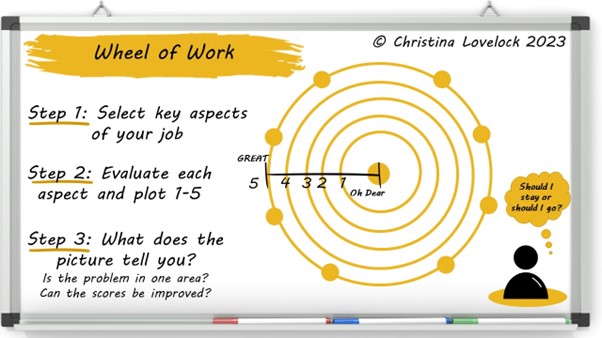
Should I Stay Or Should I Go?
New year…new job? Many professionals are grappling with this decision and it’s hard to bring objective assessment into such an emotional decision. So how do we know if it’s time to go?
Reasons To Go
People rarely leave their job for salary increase alone. Forbes reported in 2022 that company culture, low salary, poor management, lack of work-life boundaries and remote working were the top reasons people gave for leaving. In reality it is a complex blend of these reasons and others.
Once the idea of a new job has taken root, its hard to displace. By understanding what is making us want to explore if the grass is greener elsewhere it is easier to make an informed decision.
Reasons To Stay
It would be easy to assume that the reasons people stay within organizations and roles are simply the opposite of why people leave (I want to stay vs. I want to leave). But there is a further dimension which is partially or sometimes completely outside the employees control (I have to stay). External factors such as market conditions, skills and perceived “employability” can make someone stay in a role. So reasons to stay can be both personal, (“I like the culture and people”) and environmental (“I won’t find another role at this level/salary etc.”).
We all have responsibilities that cannot be ignored and not everyone gets to do their dream job, but it is always worth exploring the role that fear and self-doubt are playing in our decision making.
The Wheel of Work
A spider chart is a great way to visualize the key factors at play in a decision and how we feel about each aspect. One commonly used by coaches with their clients is the Wheel of Life. Here, we will narrow in on one area and consider all the factors which contribute to the decision to move jobs or stay put.
Step 1: Select up to 10 key factors related to work – the things which are making you think about moving, and the things which make you want to stay. These will be different and personal to each of us and will also change at different periods of our life. Try to select the ones which are most relevant to you right now.
Factors which commonly impact decision making in this area include:
- Autonomy
- Bonus/ Pension etc.
- Community
- Culture and values
- Flexibility of location/ability to work from home
- Length/cost of commute
- Level of responsibility
- Level of stress
- Life Balance
- Meaning/impact of the work
- Recognition
- Relationship with manager
- Progression opportunities
- Salary
- Security/stability
- Support for professional development
- Variety
- Working relationships
- …
(Listed alphabetically, so as not to imply importance as this is different for each of us).
These are fairly tangible considerations. There will also be emotions which are more difficult to quantify, such as levels of anxiety, fear, boredom, respect, appreciation etc. that could also be candidates for inclusion in the analysis.

Step 2: Enter the selected aspects around the wheel. Evaluate your current job against each of these. Ask questions around each aspect to prompt deeper thinking.
For example if considering “working relationships” – questions might include:
- Who are my closest colleagues?
- How often do I get to work with them?
- Have people I care about left?
- Have we stayed in touch?
- Is this the best team I have worked in?
- What made other teams better/worse?
Plot the figures 1-5, 5 being ‘could not imagine better’ and 1 being ‘could not be worse’.
Advertisement
Step 3: Consider what this diagram is telling you. Is it surprising or confirming? Is it low in every aspect? Are there related highs or related lows? What’s the common thread? Is it just one aspect of the job you don’t like that is making everything feel worse?
Step 4: This creates a baseline. This can either be used to identify actions for improving your current situation, or as a basis for comparison for other opportunities. Once you have clarity on which aspects you are happy with and where things could improve – it is much easier to have a positive and constructive conversation with your boss. It demonstrates self-reflection and commitment to making your most effective contribution to the organization. Changing projects can sometimes feel the same as moving organizations – with new colleagues and fresh challenges.
There will be lots of ways to address the low-scoring areas identified.
Once you know what is important for you in a role, it can help your job search. It can also inform the questions you ask the recruiter/hiring manager. If you are in an organization with a strong and supportive community of practice for business analysts, it may be something which is important for potential new roles. Do they have one? If not are they open to establishing one?
Without paying attention to what is important, it is hard to translate a general feeling of dissatisfaction or unhappiness into tangible actions – either a targeted effort to change aspects of your current role, or a clear understanding of what a new role would need to offer.
Staying or Stagnating?
Using the wheel of work can help us to understand what is truly important at this point in time. Staying does not have to mean stagnating. Making an active choice to stay in your current role is as important as deciding to make a change. Committing to your role and organisation, committing to your personal development and committing to do this job to the best of your ability are all incredibly positive and this is a valid career strategy. This strategy may well pay long term dividends.
Conclusion
It’s a big decision to make, as our jobs are inextricably linked with our health, wealth and happiness. The decision has a lot of factors, which are incredibly subjective and there is no simple right answer or formula that can be applied.
Ultimately, we all know when it’s time to move on.
Further reading
Job Crafting for BAs C Lovelock, Jul 2021
Are you Losing BAs? C Lovelock, February 2022